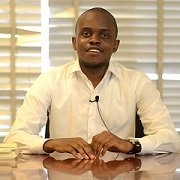The Investogist Business Saturday is a monthly event on the Investogist Forum, where a professional in a particular field makes a presentation to the members and take questions at the end of it. In the over 1 year history of Investogist Business Saturday, we have seen a wide variety of presenters discuss different topics relating to the respective fields; Lawyers, Bankers, Real Estate professionals, Entrepreneurs and Business Owners, Consultant for NAFDAC, Investment managers and money strategists, Insurance Brokers, Investment Managers and Stock Brokers etc.
Today, we are living in unprecedented times, with tremendous consequences for every one of us, both socially, health wise and financially. We cannot do much about the social restrictions we are living under, but we can prepare ourselves to make the best of the situation and ensure that we emerge from this stronger and in a better position to advance our financial objectives. April and May Business Saturdays were designed to help us guard against the potential devaluation of the Nigerian naira as a consequences of the economic squeeze brought about by Covid-19, by cushioning it’s effect on our finances and then how we can earn foreign exchange through export of commodities to not only better ourselves, but also bring in much needed Forex into the country.
Our presenter for the April Business Saturday is Mr. Victor Nnadi C. an independent Economics Researcher at Growthnotes Enterprise. He will be tackling the topic Trading Contract For Differences (CFDs): Forex, Indices, and Commodities. What follows is the presentation made yesterday 18th April 2020 on the Investogist Forum.
Victor Nnadi C.
I’ll start my presentation with an instrument I believe we are familiar with; Stocks. I know a good fraction of the Investogist Investment community is invested in the stock market. We all know that stocks allow you to own a part of a company and earn dividends and capital gains.
However, there are different ways people invest in stocks,
- Some people invest in stocks that pay high dividends so they can earn from dividends each year.
- Some like Warren Buffet invest in stocks to take advantage of compound interest and get capital gains over the years.
- Some buy stocks in anticipation that it will soon rise and they can sell and profit form price difference. This is called trading.
Trading is purely buying low to sell high and it is the basis of CFD.
CFD in full means Contract For Difference. A contract for difference is an agreement between an Investor and a CFD broker to exchange the difference in the value of a financial product between the time the contract opens and closes. They key here is profiting from price movement from one level to another.
Types of CFD Instruments
Forex The foreign excahnge market is the largest financial market in the world with a daily market capitalization of $5.1 Trillion, dawrfing all global stock exchange by more than a whooping $4.5 Trillion. Investment and Commercial banks, Central Banks, Hedge funds and Money Managers, Big Operations and Retail Traders make up the players of this market. For us retail traders, that make up a tiny fraction of traded volume, this gigantic market is made available to us via spot prices of instruments. It is specifically designed for speculation of exchange rates of currencies which is the basic activity of a retail trader. We make money form the rise and fall of exchange rates of currencies paired against each other.
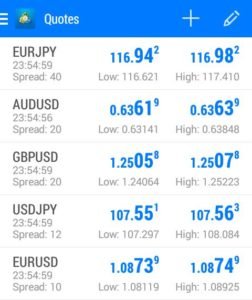
Indices These are indicators of the performance of select market instruments. Popular ones include S&P 500 and the US30. You can make money from the rise or fall of the index current value. The S&P 500 tracks the top 500 US stocks.
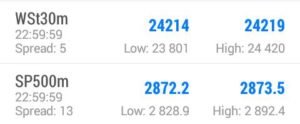
Commodities You make money from the price of commodities like Oil (Brent and WTI) and Natural gas.
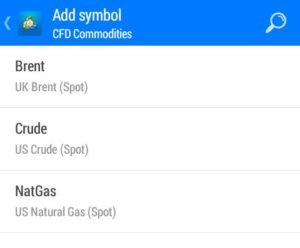
Markets You can as well make money from the rise and fall of precious metals like Gold and Silver
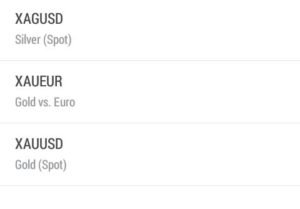
Advantages of CFDs
- It is traded Over the Counter (OTC). OTC instruments are traded on interbank networks and not on any local exchange like stocks are. This accrues benefits like 24/7 market open hours, high liquidity and zero capital gains tax since it is an international market and immune to local jurisdictions.
- You don’t have to own actual assets. When you enetr a trade, nobody will deliver actual currency notes, oil barrels, gold bars, or gas tanks to your house. This is because you are not buying the assets themselves. You are contracting a position to earn from price fluctuations alone. This brings me to the next advantage.
- You can enter an investment with any amount. Even NGN100, unlike stocks and futures where you need to have enough to purchase at least 1 unit of the instrument. This is because you are earning from movement alone.
- Short selling: In stocks, short selling is very difficult and risky. A lot of logistics are involved. But in CFDs, since you are not dealing with the instruments themselves, and only the price, you can profit from bear markets as easily as you can from bulls.
- You can trade things that are not essentially assets like S&P 500 index, as long as it fluctuates, it is tradable.
- Leverage: In the stock market, the movement of price means different things to different people depending on account size. I bought a unit of Nestle last year at NGN1800 and in this corona economy it has fallen to NGN750. I lost about NGN1050 because I had just 1 unit. But think about someone who probably had a million shares of Nestle, that would have been a whooping 1B naira loss in value because of his account size. Brokers however give you leverage, you can borrow money from them so that you can enter a bigger position. I use an account leverage of 1:1000, so with my current $1500 account balance, I can trade in a position of someone with $1.5 million account. I can make/lose more than 1 normally should be able to per trade.
How to open a Forex Account
Choose any of the good brokers out there. Make sure the one you choose is regulated and not an offshore broker. Offshore brokers can be scrupulous, can dupe you, or file bankruptcy at the expense of your deposit. Good brokers are Onada, FXTM, IC Markets, Lite Forex etc. I personally use FXTM, and you can use my link to join so that I can know you and forward key educational content available to FXTM users.
Got to http://linktr.ee/nnadivictorc and click “Start Trading Forex Today” to sign-up for free.
How to Trade
Design a trading plan: Decide what kind of account you want to open, what instruments your portfolio should contain and what risk/reward ratio you are willing to work with. In my plan, I have a maximum risk per trade of $30. Whenever I want to open a position, this helps me decide how big my lot size will be and where my stop loss will be placed. Here’s a fun story;
By the way, I know some terminologies here will not sound familiar at all. I consider this class as an expose. If I am to do a thorough breakdown of terms, even a 3 day video course may not be enough. Please bear with me, I’ll share a book at the end that most forex traders like myself kick started their careers with. So here is my fun story.
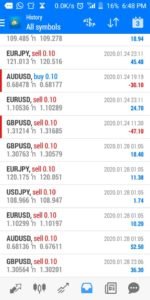
As you’ll notice from the image, I have always used a 0.10 lot size for all my trades since November. But in the first week of March, Coronavirus started to hit the markets really hard. Volatility spiked and my stop loss could no longer withstand the swings of a normal trade day. So I faced situations where I would enter a buy position for instance, and a fake swing to the bear side could hit my stop loss levels and still rebound to the bull side. I had a 3-day losing streak because of this. I had to pause trading till first week of April when I was finally able to understand what was going on and how to salvage it. I increased my stop-loss levels based on moving 2-day volatility data and reduce my lot size to fit my $30 day risk tolerance. And that solved the problem. I have bee trading ever since even with the still unstable volatility.
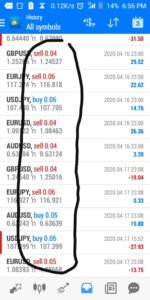
The reduced lot size in recent trades is shown in the picture above. So a trading plan helps you decide a decent amount you want to be earning per month for instance, and how the market can help you achieve that.
Get a Trading Strategy: This is your market criteria for entering or exiting a position. There are different strategies out there. Eg Pullback, rangebound, momentum trading, these depend of Technical analysis. Carry trade is another strategy, but depends on fundamental analysis. It has a high win rate buy may require a large capital base. The strategy is popular among hedge funds, large banks and some retail traders. It’s a simple way to trade where you just have to monitor interest rate announcements from 8 central banks around the world.
Disadvantages
- No dividends, no AGMs, no show offs, CFDs don’t give you some of the benefits of owning assets like dividends, AGMs, voting rights and the ego boost of showing off gold bars to your friends.
- No regulation. An important one to note. CFD trading is not regulated by exchanges. In fact it is not recognized by the US SEC. So it is easy to have scrupulous brokers participating, as they are not required to publish exposing data as exchange participants are required to.So you have to be cautious and go for brokers that have at least a CyS regulation in Cyprus. Oanda is a good broker that though not regulated by the SEC, is regulated by the US FCA. So it is very popular among US citizens. The catch is that the US allows it’s brokers to only give you a maximum leverage of 1:50 for consumer protection.
- You can lose all of your invested capital. This is one phenomenon that scares people away from CFDs. In stocks, you can only lose all investments when a company goes bankrupt and the stock loses all its value, which is quite rare.But for CFDs, the price can easily fluctuate past what your account can carry, and your broker will cut you out of the trade if you don’t respond to the dreaded margin call. Something interesting happened on 15th January 2015, days before the Swedish National bank announced that it was struggling to keep the exchange rate of USDCHF from falling through a particular low, but to no avail. The price fell so fast that brokers system could not catch up to close open traders zero balance. So some traders lost their entire funds and even went into the negative region, thereby owing the brokers. One can only imagine how many suicides and depressions happened that day. The move was a whooping 2200 pips. To put that in context, in this crazy volatility period of Coronavirus the biggest day range I have seen is 634 pips. If I was there, even with my conservative trade size, I could have lost my entire account and owed the brokers. But I wouldn’t have lost because I have analyzed the event and the move was in favour of my strategy. So I would have turned my $1500 account to $3700 in one day. These rare events are the dangers of being a retail trader with small funds. CFDs is indeed a kind of extreme sport. It is risky, that is why brokers are required by law to tell you that.
- Leverage. This advantage is also here as a disadvantage. It is double edged sword of retail trading. It is what magnifies loses and destroys account balances.
Controversies
It is argued that CFDs is bad because 70% of traders lose money, but when you contrast that to the fact that 80% of businesses fail in their fisrt five years, You’ll remember that there is really no pain without gain.
How to win
- Study (very very hard).
- Practice with a demo as an entirely new beginner.
- Start with a large account of at least $1000.
- Put money you can afford to lose at first so that your emotions will be under control.
- Pay attention to fundamental news.
- Don’t be scared and don’t be greedy.
Here’s my last funny story.
In CFDs there is something we call revenge trading. This happens when you lose and try all impossible means to get it back. This only leads to more loses. I fell victim to this when I had a losing streak due to Coronavirus volatility. I entered desperate revenge trading mode. I traded Oil that I had never traded before and lost all the trades.
![]()
Then I proceeded to launch 5 duplicate trades of EURUSD out of desperation and more revenge trading. And I lost all as well.
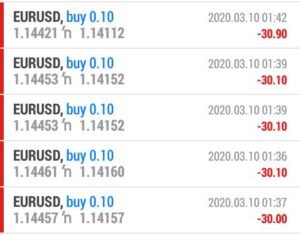
So I decided to go on a trading holiday. My account fell from $1308 to about $960. I only made back those loses when I traded the S&P 500 and the US 30 when the Oil saga went down between Saudi Arabia and Russia. I sold the indices and made a decent $322 from it.
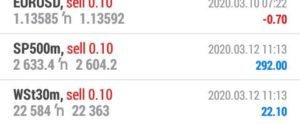
And then I bought them again when Congress approved the $2 Trillion stimulus package raking in another $215. That’s how I got my account back to $1505. Even these trades were outside portfolio. So it was a guilty pleasure. So I don’t trade the indices again now.
Conclusion
CFDs is readl and profitable. I am on a challenge to double $1000 and as you can see Iwould have reached that goal if not for revenge trading and human errors. But I am still half way in just 3 months. CFDs tests your virtues as a human being. Only the patient, content and diligent shall win.
Thank you for listening.
Disclaimer: Any person accessing this information and considering potential investment opportunities featured here should make their own commercial assessment of an investment opportunity after seeking the advice of an appropriately authorized or regulated financial advisor. This information should not be construed as advice or a personal recommendation to any prospective investor.










































